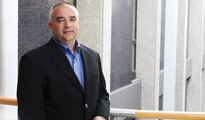 "In 2007 we launched Edwards Career Services with the purpose to enhance the undergraduate student experience," said its director, Brent Wellman. "We offer experiential learning opportunities outside of the classroom with our co-operative programming."
"In 2007 we launched Edwards Career Services with the purpose to enhance the undergraduate student experience," said its director, Brent Wellman. "We offer experiential learning opportunities outside of the classroom with our co-operative programming."
Through the Co-operative Education Program, third year business students have the chance to work for up to eight months—split into two four-month placements from January to August—in a fulltime position with a local organization, explained Wellman. "These placements make use of the students' education and give the students the chance to make connections between classroom instruction and real-life work situations," he said, adding that students in all business majors can participate in the program and that the experience is recognized on their transcripts and parchment degree.
Wellman sees it as a win-win situation.
Beyond making connections between class and career, students also connect with mentors, said Wellman. "Finding a mentor can be a valuable experience for students and can provide a lot of insight into figuring out what career path to pursue."
Students also benefit from eight months of full-time paid work experience, he said. "The opportunity to work for that length of time provides real experience working on real projects. This contributes to the student's educational experience and improves employability upon graduation," Wellman explained, pointing to a 100 per cent employment rate for co-op students immediately after graduation compared to 74 per cent of non-co-op students, although some recent graduates travel or continue their education as opposed to pursuing a career.
The partner organizations also benefit. "Employers get the chance to hire an eager and well-educated student," he said. "Because it is for eight-months, they can dedicate the student to a specific need or project and get specific expertise."
Another employer advantage is that it is "more viable financially for a company to bring in a student for eight months rather than hiring a fulltime employee. But the truth is most students do become fulltime employees of the company with which they were placed once they graduate. This saves recruitment and training costs as well."
Wellman stresses the importance of identifying a need for the employer as the best way to ensure mutual benefit. "We always ask potential employers what their needs are. Then we determine if we can meet those needs. The important thing is that the organization's needs and resources match our timelines and skills of the students."
According to Wellman, the co-op program, now five years old, has proven to be quite successful. "More than 50 local companies have taken part in placements; everything from government, corporations and industry. There are diverse opportunities from mining to advertising to public accounting."
Expectations in 2012 are pretty high, said Wellman. "We already have 70 students enrolled looking for placements starting in January. We are also starting an experiential learning component to the MBA program this fall."
Experiencing business education
Students taking advantage of co-operative learning programs in the Edwards School of Business at the University of Saskatchewan land jobs after graduation 100 per cent of the time.